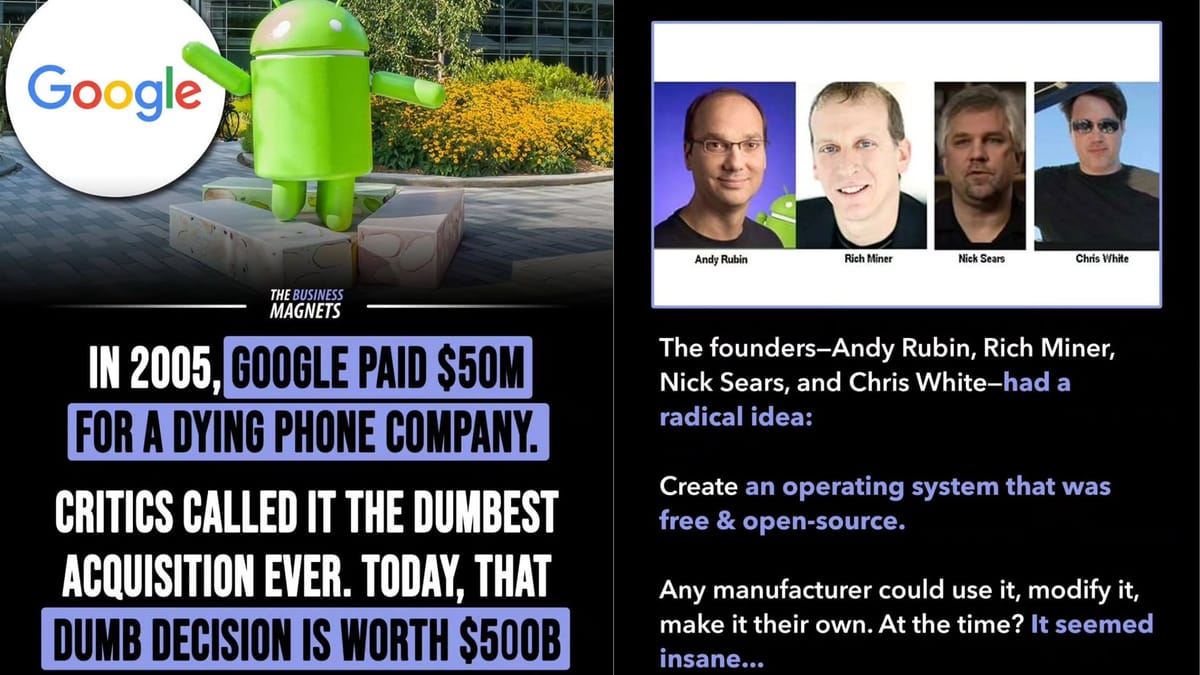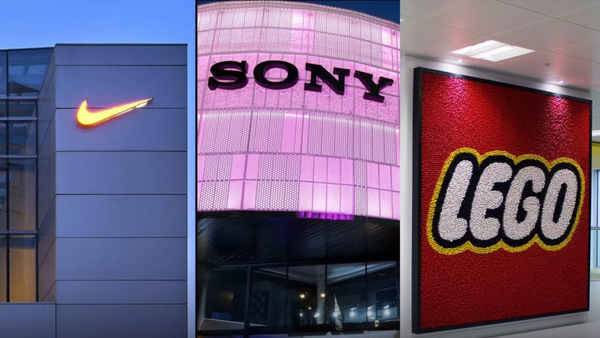In 2005, Google Paid 50$M for Dying Phone Company. Critics Called it the Dumbest Acquisition Ever. Today that Dumb decision is worth $500B
When Google bought a struggling mobile phone company for just $50 million in 2005, many critics thought the tech giant had made a huge mistake. In fact, some even called it “the dumbest acquisition ever.”

History often shows, what seems like a foolish decision at the time can sometimes turn into a game-changing move that reshapes industries.
The Gamble That Changed Everything
Back in 2005, Android was far from the ubiquitous powerhouse it is today. The company was small, struggling, and focused on building software for digital cameras, not phones. Its team, led by co-founders Andy Rubin, Rich Miner, and Nick Sears, had a vision for mobile technology, but it was still in its infancy.
But Google, always looking ahead, saw something that others didn’t. The company believed that the future of the internet would be mobile, and to get there, they would need an operating system that could compete with the established giants, like Apple’s iOS and Microsoft’s Windows Mobile. Android, despite its uncertain future, was the perfect candidate.
At the time, Google was primarily a search engine company, but it had already begun making waves with other innovations, including Gmail, Google Maps, and Google Earth. They understood that mobile was the next frontier, and rather than simply make a play for a device, they decided to make a bold, long-term investment in an operating system that could power the next generation of smartphones.
The Critics Speak Up
The critics were loud and clear: “Why is Google buying a small, failing company that has nothing to show for itself?” They questioned Google’s leadership for spending so much on a company with an uncertain future in a market dominated by much bigger players.
The mobile phone industry at the time was led by companies like Nokia, BlackBerry, and Motorola, and Apple had yet to disrupt the market with its revolutionary iPhone. Android, as a platform, was still far from becoming the global force it is today.
But Google had the vision to see past the noise and focus on what mattered: the long-term potential. They didn’t just acquire Android for the software. They bought into the idea of a world where everyone could access the internet on a mobile device, and Android was the key to making that vision a reality.
Android's Meteoric Rise
Fast forward nearly two decades, and Google’s $50 million investment in Android looks nothing short of genius. Today, Android powers over 70% of the world’s smartphones, from budget-friendly devices to flagship models. It has become the dominant mobile operating system globally, far outpacing iOS in terms of market share.
But Android’s success didn’t just stop at smartphones. It became the backbone for tablets, wearables, smart TVs, and even cars. In fact, Android has reached over 3 billion active devices worldwide, making it the most widely used operating system ever created.
The $500 Billion Impact
Google’s bold decision to acquire Android for $50 million now seems like a steal. The Android ecosystem, with its app stores, developer tools, and hardware partners, has become a multi-billion-dollar industry in its own right. Google’s Android division alone is worth an estimated $500 billion today.
While Google never intended to sell Android as a standalone product, the company has benefited immensely from its acquisition. It has created an entire ecosystem that supports not only mobile devices but also smart home technology, enterprise solutions, and even AI-powered applications that drive Google’s other major products, such as Google Assistant and Google Search.
What This Teaches Us About Risk and Vision
The story of Android’s rise is a powerful reminder of the value of taking risks, especially when those risks are based on a clear vision for the future. Google’s leadership didn’t just buy Android to profit from mobile phones. They saw a future where mobile technology was central to everything — from communication to commerce to entertainment.
The lesson here is simple, but profound: sometimes, the biggest risks lead to the greatest rewards. The companies that change the world don’t always play it safe. They invest in ideas that may not seem obvious at the time, but when those ideas align with the future, the payoff can be extraordinary.
Conclusion: Why the Biggest Risks Can Lead to the Biggest Rewards
What seemed like a risky bet in 2005 turned into one of the smartest and most profitable decisions in tech history. Google's acquisition of Android wasn’t just about buying a struggling company — it was about investing in a future where mobile technology would dominate our lives. That investment has paid off in ways no one could have imagined, turning Android into a $500 billion behemoth and transforming the way we interact with technology.
So, the next time you're faced with a tough decision or an uncertain opportunity, remember the story of Google and Android. Sometimes, the boldest moves are the ones that change everything.
At The Business Magnets, we believe in the power of visionary leadership and the rewards that come with taking calculated risks. Whether in technology, business, or entrepreneurship, the future belongs to those who dare to make the smart bets today.




